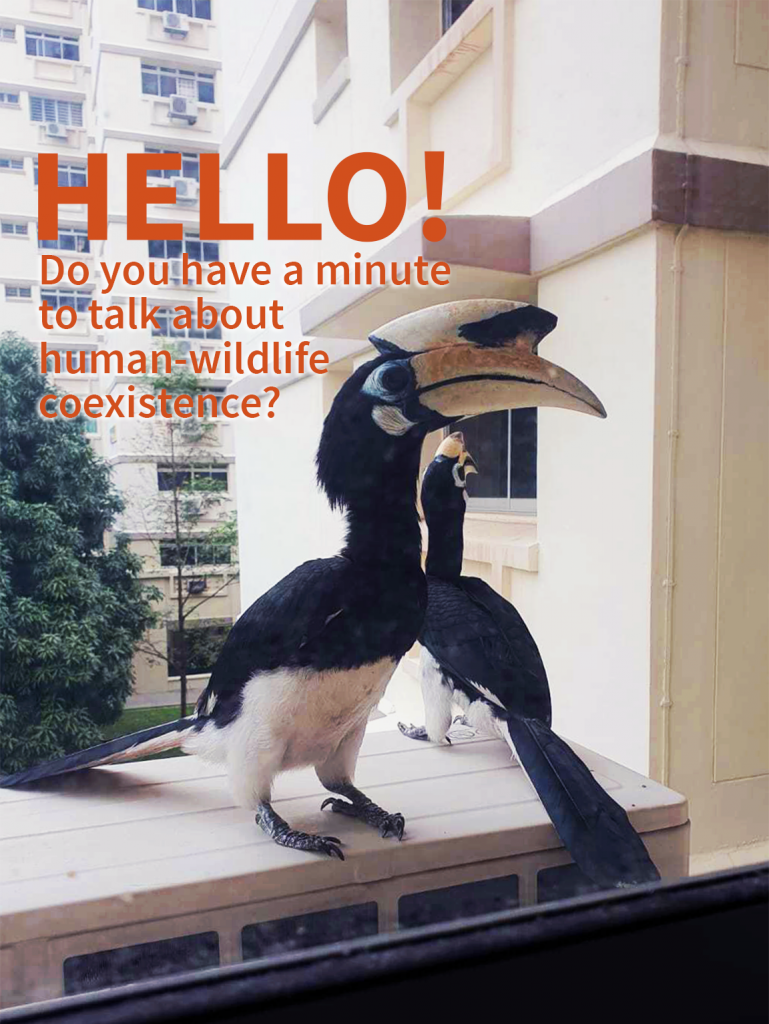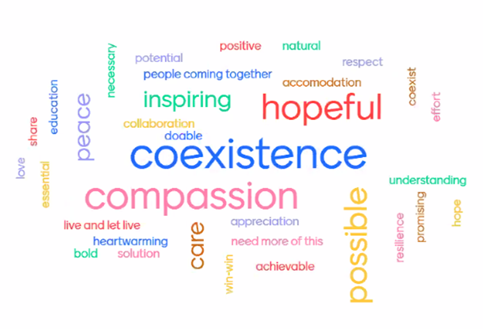Compassion. Hopeful. Coexistence
When I was approached by my colleague, Kai from Our Better World (OBW team) on whether I was keen to attend the upcoming wildlife event and write for the community blog, I jumped at the chance – quite literally jumped out of my seat. As part of the Singapore International Foundation’s Planning and Partnership team and an avid fan of OBW’s work, being able to meet with OBW’s story subjects and contribute to their work in a small way, was a dream come true.
This past year, with the circuit breaker (Singapore’s version of the lockdown), travel restrictions and subsequent social distancing measures, I’ve developed quite an appreciation for the wildlife in my own backyard.
 With less people moving around outside of their homes during the circuit breaker coupled with the rapid urbanisation of our city has driven wildlife out of their usual hiding spaces and straight into our domains. From celebrity owl fledglings to otter family drama, our animal friends have made the headlines time and again. Unfortunately, not all publicity is good publicity. Conflict between humans and wildlife have intensified, with run-ins resulting in injury and at times, loss of life for the animal.
With less people moving around outside of their homes during the circuit breaker coupled with the rapid urbanisation of our city has driven wildlife out of their usual hiding spaces and straight into our domains. From celebrity owl fledglings to otter family drama, our animal friends have made the headlines time and again. Unfortunately, not all publicity is good publicity. Conflict between humans and wildlife have intensified, with run-ins resulting in injury and at times, loss of life for the animal.
Having discovered that this year OBW was addressing this issue with their sub-theme of human-wildlife conflict for its Wildlife Series, I was excited at the opportunity to attend “STORY TALK: Human-Wildlife Conflict” and meet the people working with local communities to promote peaceful human-wildlife coexistence – David Owen from Bring the Elephant Home (BTEH), Sanjay Sondhi from Titli Trust, and Anbarasi Boopal (Anbu) from Animal Concerns Research and Education Society (ACRES).
I listened in respect and admiration as David and Sanjay shared how the very communities whose livestock, livelihood and even lives impacted by the elephants and leopards in their midst, are learning to adapt to share the land they live in. But it’s not without persistence and struggles. Their efforts, which include developing relationships with the locals and getting them involved in creating and implementing these initiatives to resolve human-wildlife conflict, exemplifies how educating and empowering community changemakers can go a long way in achieving sustainable solutions.
Three Words - Compassion; Hopeful; Coexistence
During the event, Mai, Community Lead at OBW and moderator asked participants to share words that come to mind when we think of the future of human-wildlife coexistence. Entries started to stream in
Peace. Possible. Promising.
As the word cloud grew, three words stood out:
Compassion. Hopeful. Coexistence
 While humans are a part of the problem, we are also very much a key piece of the solution. It helps if we understand that human population growth and urban transformation projects have blurred the lines between natural wildlife habitats and our living spaces. Playing an active role in managing human-wildlife encounters involves us to better understand our wild neighbours and their behaviours, being educated in the dos and don'ts when we encounter them and taking necessary steps to mitigate conflict.
While humans are a part of the problem, we are also very much a key piece of the solution. It helps if we understand that human population growth and urban transformation projects have blurred the lines between natural wildlife habitats and our living spaces. Playing an active role in managing human-wildlife encounters involves us to better understand our wild neighbours and their behaviours, being educated in the dos and don'ts when we encounter them and taking necessary steps to mitigate conflict.
Whilst things may be more complicated in Thailand and India, having to manage regular encounters with elephants and leopards, here in Singapore, Anbu from ACRES highlighted how immediate actions can be straightforward:
- Stop feeding animals;
- Knowing the appropriate hotline to call when we encounter a wild animal out of place or in need of help;
- Practising proper trash management in and around nature pockets.
As we parted ways after the talk, one thing was clear – we are but one of the many different species living on this planet. Biodiversity conservation is necessary for our global ecosystems to thrive and for ensuring our own survival. We can surely do better to become a compassionate society, to make kinder informed choices, to share this space with our wild neighbours so we may preserve hope of human-wildlife coexistence for future generations.
Compassion. Hopeful. Coexistence.





